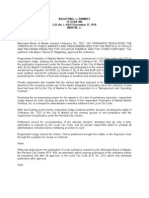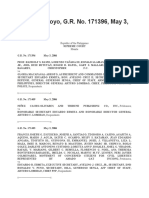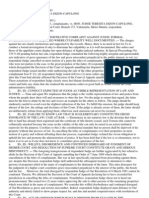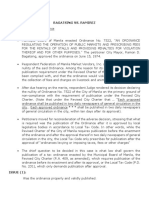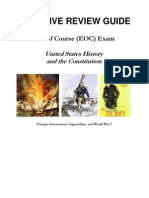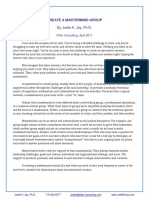Bagatsing V Ramirez
Bagatsing V Ramirez
Uploaded by
Marc VirtucioCopyright:
Available Formats
Bagatsing V Ramirez
Bagatsing V Ramirez
Uploaded by
Marc VirtucioOriginal Description:
Original Title
Copyright
Available Formats
Share this document
Did you find this document useful?
Is this content inappropriate?
Copyright:
Available Formats
Bagatsing V Ramirez
Bagatsing V Ramirez
Uploaded by
Marc VirtucioCopyright:
Available Formats
G.R. No. L-41631.
December 17, 1976
HON. RAMON D. BAGATSING vs. HON. PEDRO A. RAMIREZ
Facts
Municipal Board of Manila enacted Ordinance 7522 which regulated markets
and prescribed fees for rentals of stalls
Private Respondent Federation of Manila Market Vendors sought to declare
the ordinance void for (1) failing to meet the publication requirement, (2)
failing to allow the Market Committee to participate in its enactment,
violating Art. 3 of the Anti-Graft and Corrupt Practices Act, and (4) the
ordinance violated PD No. 7 which already imposed fees and charges on
livestock and animal products
Lower Court: petition was granted; the court declared ordinance null, for
failing to follow rules on publication.
Petitioners moved for reconsideration arguing that (1) only a post-
publication is required by the Local Tax Code and (2) respondent failed to
exhaust all administrative remedies.
Issue/Holding/Ratio
1. Whether or not the tax ordinance was properly published? YES, the petition
is impressed with merit.
While the Revised Charter of the City of Manila requires publication before
the enactment of the ordinance and after the approval thereof in two daily
newspapers of general circulation in the city, the Local Tax Code only
prescribes for publication after the approval of "ordinances levying or
imposing taxes, fees or other charges" either in a newspaper or publication
widely circulated within the jurisdiction of the local government or by posting
the ordinance in the local legislative hall or premises and in two other
conspicuous places within the territorial jurisdiction of the local government.
There is no question that the Revised Charter of the City of Manila is a
special act since it relates only to the City of Manila, whereas the Local Tax
Code is a general law.
[IMPORTANT] HOWEVER, where a special statute refers to a subject in
general, while a general state treats a subject in particular, the general
statute should prevail.
In this case, although the Revised Charter of the City of Manila is dominant
as to ordinances in general, it is inferior when it approaches the realm of
ordinances levying or imposing taxes, fees or other charges in particular.
This is where the Local Tax Code controls.
Thus, only a post-publication is required, which was accomplished
in this case.
There is no rule which prohibits repeal by implication. A charter provision
may be impliedly modified or superseded by a later statute.
A chartered city is not an independent sovereignty. A charter must yield to
the constitution and general laws of the state.
2. WON respondent failed to exhaust all administrative remedies? It is
unnecessary, as the controversy is deeply rooted in a pure question of law.
Exhaustion is not an absolute rule. It admits of exception when the question
is purely legal, and when there is no plain, speedy, and adequate remedy.
3. WON the subject ordinance is a revenue-raising function and not a tax
ordinance, which would make the procedure for publication inapplicable?
Precisely, the raising of revenues is the principal object of taxation.
Art. X, Sec. of the Constitution: Each local government unit shall have the
power to create its own sources of revenue and to levy taxes, subject to
such provisions as may be provided by law.
Local Tax Code: Local governments may collect fees for the occupancy or
use of the public markets and premises
Feeble to argue that the ordinance violates PD 7 because the decree
prescribes the collection of other fees with the exception of ante-mortem
and post-mortem inspection fees, as well as the delivery, stockyard, and
slaughter fees
4. WON the ordinance should be nullified for failing to allow the Market
Committee to participate in its enactment? No, the function of the
committee is purely recommendatory. Its prior acquiescence is not a
condition sine qua non to enactment.
5. WON the market stall fees are being given to a certain Asiatic Integrated
Corporation for its exclusive private use under a Management and
Operating Contract? No, the entrusting of the collection of fees does not
destroy the public purpose. It does not matter whether the agency through
which the money is dispensed is public or private.
You might also like
- Sexual Harassment QuizDocument3 pagesSexual Harassment QuizdeveshwerNo ratings yet
- Tidcorp Vs CSC DigestDocument3 pagesTidcorp Vs CSC DigestR.A. Gregorio100% (1)
- 129 SCRA 174 Pesigan Vs AngelesDocument4 pages129 SCRA 174 Pesigan Vs AngelesFran SuarezNo ratings yet
- Ople V TorresDocument3 pagesOple V TorresshelNo ratings yet
- People v. SiyohDocument2 pagesPeople v. SiyohMarc Virtucio100% (2)
- Searching For An Identity in A Society Full of LabelsDocument3 pagesSearching For An Identity in A Society Full of LabelsJoshua BrownNo ratings yet
- BAGATSING Vs RamirezDocument2 pagesBAGATSING Vs RamirezDaniel Marinduque50% (2)
- Pelaez V Auditor General PDFDocument34 pagesPelaez V Auditor General PDFJenny Mary DagunNo ratings yet
- IMBONG vs. COMELEC 35 SCRA 28 G.R No. L-32432, SEPTEMBER 11, 1970Document15 pagesIMBONG vs. COMELEC 35 SCRA 28 G.R No. L-32432, SEPTEMBER 11, 1970EriyunaNo ratings yet
- Stat Con Case Digest IiDocument15 pagesStat Con Case Digest IiDjøn AmocNo ratings yet
- 2 The City of Davao V RTC BranchDocument1 page2 The City of Davao V RTC BranchErnesto A. AmoraNo ratings yet
- Consti Digests 2Document13 pagesConsti Digests 2Joey AusteroNo ratings yet
- Case 1. David v. Macapagal-Arroyo, GR No. 171396, 3 May 2006Document71 pagesCase 1. David v. Macapagal-Arroyo, GR No. 171396, 3 May 2006Bryan delimaNo ratings yet
- Declaration of Sole AdjudicationDocument1 pageDeclaration of Sole AdjudicationByron ClaroNo ratings yet
- 028 Ordillo Vs COMELECDocument2 pages028 Ordillo Vs COMELECthornapple25100% (1)
- 192 Scra 100 - Ordillo Vs ComelecDocument13 pages192 Scra 100 - Ordillo Vs ComelecracaliguirancoNo ratings yet
- Aboitiz Shipping Corporation vs. City of Cebu PDFDocument1 pageAboitiz Shipping Corporation vs. City of Cebu PDFFelix TumbaliNo ratings yet
- PHILJA V Hon. Pete Prado G.R No. 105371, November 11, 1993 FactsDocument2 pagesPHILJA V Hon. Pete Prado G.R No. 105371, November 11, 1993 FactsVIRILITER AGITENo ratings yet
- Victorias Milling Co V Social Security CommDocument1 pageVictorias Milling Co V Social Security CommJave Mike AtonNo ratings yet
- Statcon DigestDocument12 pagesStatcon DigestMczoC.MczoNo ratings yet
- fullRecordOfTheConstitutionalCommissionVolumeI PDFDocument805 pagesfullRecordOfTheConstitutionalCommissionVolumeI PDFKristineNo ratings yet
- David vs. Arroyo, G.R. No. 171396, May 3, 2006Document38 pagesDavid vs. Arroyo, G.R. No. 171396, May 3, 2006Michelle SilvaNo ratings yet
- Mitigating DigestsDocument14 pagesMitigating DigestsCamille DRNo ratings yet
- Law116 A4 SanPabloVCIRDocument2 pagesLaw116 A4 SanPabloVCIRpolgasyNo ratings yet
- Chaves V JCBDocument10 pagesChaves V JCBKaren Feyt MallariNo ratings yet
- National Marketing Corporation Vs Tecson (Aug 27,1969)Document3 pagesNational Marketing Corporation Vs Tecson (Aug 27,1969)Vincent OngNo ratings yet
- Bolinao Electronics Vs ValenciaDocument1 pageBolinao Electronics Vs ValenciaAngelGempNo ratings yet
- Stat Con Digest 1Document5 pagesStat Con Digest 1Dayle ManlodNo ratings yet
- (DIGEST) Dabalos vs. RTC Branch 59, Angeles City, 688 SCRA 64, January 7, 2013Document1 page(DIGEST) Dabalos vs. RTC Branch 59, Angeles City, 688 SCRA 64, January 7, 2013Harold Q. GardonNo ratings yet
- CIR Vs PrimetownDocument1 pageCIR Vs PrimetownMr GawisNo ratings yet
- Co vs. Electoral TribunalDocument2 pagesCo vs. Electoral Tribunalkitakattt100% (1)
- G.R. No. 168056 September 1, 2005 - Abakada Guro Party List v. ErmitaDocument4 pagesG.R. No. 168056 September 1, 2005 - Abakada Guro Party List v. ErmitaGab EstiadaNo ratings yet
- ABAKADA Guro Partylist v. PurisimaDocument1 pageABAKADA Guro Partylist v. PurisimaRon DecinNo ratings yet
- Cristobal vs. Labrador (Digest 2)Document2 pagesCristobal vs. Labrador (Digest 2)AJ AslaronaNo ratings yet
- Romulo, Mabanta, Buenaventura, Sayoc & de Los Angeles vs. Home Development Mutual FundDocument4 pagesRomulo, Mabanta, Buenaventura, Sayoc & de Los Angeles vs. Home Development Mutual FundJoanne CamacamNo ratings yet
- Statcon NotesDocument71 pagesStatcon NotesNeil Mayor100% (1)
- StatCon 100315Document12 pagesStatCon 100315Francis DiazNo ratings yet
- 00consti1 1Document30 pages00consti1 1liboaninoNo ratings yet
- Peralta V Director of PrisonsDocument6 pagesPeralta V Director of PrisonsChow Momville EstimoNo ratings yet
- Araneta v. Dinglasan 84 Phil 368Document3 pagesAraneta v. Dinglasan 84 Phil 368Sittie Rania Ismael CandotanNo ratings yet
- 28 Garcia v. MataDocument3 pages28 Garcia v. Matajan100% (2)
- Ondoy Vs IgnacioDocument1 pageOndoy Vs IgnacioAly RzNo ratings yet
- Uy V CapulongDocument5 pagesUy V CapulongEdward JulianNo ratings yet
- WLC V City Mayor of ManilaDocument3 pagesWLC V City Mayor of ManilaSophia CaraldeNo ratings yet
- Lagman vs. City of Manila Et Al.Document8 pagesLagman vs. City of Manila Et Al.Charmaine Grace0% (1)
- Molina Vs RaffertyDocument18 pagesMolina Vs RaffertyShivaNo ratings yet
- Manila Railroad Co. vs. RaffertyDocument4 pagesManila Railroad Co. vs. RaffertyRalph Mark JosephNo ratings yet
- Municipality of San Fernando, La Union vs. Judge Firme, 195 SCRA 692Document6 pagesMunicipality of San Fernando, La Union vs. Judge Firme, 195 SCRA 692Boy George100% (1)
- CONSTI DIGEST - Concept of The StateDocument5 pagesCONSTI DIGEST - Concept of The StateKim ZayatNo ratings yet
- Macabingkil vs. Yatco, G.R. No. L-23174, September 18, 1967 (FULL CASE)Document5 pagesMacabingkil vs. Yatco, G.R. No. L-23174, September 18, 1967 (FULL CASE)Sharliemagne B. BayanNo ratings yet
- Sambeli V Province of Isabela 210 - SCRA - 80Document5 pagesSambeli V Province of Isabela 210 - SCRA - 80mmagsilaNo ratings yet
- Bagatsing vs. Ramirez DigestedDocument1 pageBagatsing vs. Ramirez DigestedMay Angelica TenezaNo ratings yet
- People vs. Que Po LayDocument1 pagePeople vs. Que Po LayMarion Nerisse Kho0% (1)
- Case - 11 - Antonio - Laurel v. Misa 77 Phil 856Document1 pageCase - 11 - Antonio - Laurel v. Misa 77 Phil 856John Dacanay SolivenNo ratings yet
- Res 18 S 2005 PDFDocument2 pagesRes 18 S 2005 PDFJopan SJNo ratings yet
- Statcon Cases 7-12Document8 pagesStatcon Cases 7-12Frances Grace DamazoNo ratings yet
- G.R. No. 86675 - MRCA v. Court of AppealsDocument3 pagesG.R. No. 86675 - MRCA v. Court of AppealsStGabrielleNo ratings yet
- Digest Mo Lang StatconDocument30 pagesDigest Mo Lang StatconLawardCaps100% (1)
- People vs. JalosjosDocument1 pagePeople vs. JalosjosFe PortabesNo ratings yet
- Belgica V Executive SecretaryDocument2 pagesBelgica V Executive SecretaryPhilip Leonard VistalNo ratings yet
- Case Digest: AIR TRANSPORTATION OFFICE Vs Sps. RAMOSDocument2 pagesCase Digest: AIR TRANSPORTATION OFFICE Vs Sps. RAMOSSamantha Nicole de Dios100% (1)
- Bagatsing vs. RamirezDocument2 pagesBagatsing vs. RamirezGendale Am-isNo ratings yet
- Bagatsing Vs RamirezDocument2 pagesBagatsing Vs RamirezKrystel Hypa MagallanesNo ratings yet
- Frabelle Fishing V PhilAmDocument1 pageFrabelle Fishing V PhilAmMarc VirtucioNo ratings yet
- Confederation of Citizens Labor Union VDocument1 pageConfederation of Citizens Labor Union VMarc VirtucioNo ratings yet
- Samahan Sa Pacific Plastic V LaguesmaDocument2 pagesSamahan Sa Pacific Plastic V LaguesmaMarc VirtucioNo ratings yet
- Trans-Asia Shipping Lines v. CADocument2 pagesTrans-Asia Shipping Lines v. CAMarc Virtucio0% (1)
- YSS Employees V YSS LaboratoriesDocument1 pageYSS Employees V YSS LaboratoriesMarc VirtucioNo ratings yet
- Phimco Vs BrilliantesDocument1 pagePhimco Vs BrilliantesMarc VirtucioNo ratings yet
- Manila Cordage v. CIRDocument3 pagesManila Cordage v. CIRMarc VirtucioNo ratings yet
- National Federation of Labor v. MOLEDocument1 pageNational Federation of Labor v. MOLEMarc VirtucioNo ratings yet
- PLDT v. ManggagawaDocument2 pagesPLDT v. ManggagawaMarc VirtucioNo ratings yet
- PSBA V Noriel - NarvacanDocument2 pagesPSBA V Noriel - NarvacanMarc VirtucioNo ratings yet
- 09 - Pharmacia & Upjohn v. Albayda, JRDocument2 pages09 - Pharmacia & Upjohn v. Albayda, JRMarc VirtucioNo ratings yet
- Abdulla v. PeopleDocument1 pageAbdulla v. PeopleMarc VirtucioNo ratings yet
- Univ of Immaculate Conception V Sec of LaborDocument2 pagesUniv of Immaculate Conception V Sec of LaborMarc VirtucioNo ratings yet
- Sarmiento V TuicoDocument2 pagesSarmiento V TuicoMarc VirtucioNo ratings yet
- Philtread Workers Union V ConfesorDocument2 pagesPhiltread Workers Union V ConfesorMarc Virtucio100% (1)
- Phil Airlines v. Airline PilotsDocument2 pagesPhil Airlines v. Airline PilotsMarc VirtucioNo ratings yet
- People v. MalabagoDocument1 pagePeople v. MalabagoMarc Virtucio0% (1)
- Telefunken Vs CADocument4 pagesTelefunken Vs CAMarc VirtucioNo ratings yet
- People v. AlcongaDocument2 pagesPeople v. AlcongaMarc VirtucioNo ratings yet
- People v. UralDocument1 pagePeople v. UralMarc VirtucioNo ratings yet
- 08 - Barroga V Data Center CollegeDocument3 pages08 - Barroga V Data Center CollegeMarc VirtucioNo ratings yet
- Bayan v. GMADocument2 pagesBayan v. GMAMarc VirtucioNo ratings yet
- People of The Philippine Islands vs. Graciano L. Cabrera Et AlDocument1 pagePeople of The Philippine Islands vs. Graciano L. Cabrera Et AlMarc VirtucioNo ratings yet
- People Vs TengsonDocument1 pagePeople Vs TengsonMarc VirtucioNo ratings yet
- People V BurgosDocument2 pagesPeople V BurgosMarc Virtucio100% (1)
- People v. BaesDocument1 pagePeople v. BaesMarc VirtucioNo ratings yet
- Astorga v. PeopleDocument2 pagesAstorga v. PeopleMarc VirtucioNo ratings yet
- Sanlakas Vs Executive SecretaryDocument3 pagesSanlakas Vs Executive Secretaryequus_sp5950No ratings yet
- DAY 01 POLITY (Shashidthakur23.Wordpress - Com)Document6 pagesDAY 01 POLITY (Shashidthakur23.Wordpress - Com)AbhishekKurilNo ratings yet
- City of MandaluyongDocument3 pagesCity of MandaluyongSunStar Philippine NewsNo ratings yet
- Human RightsDocument41 pagesHuman RightsJoshua Lander Soquita CadayonaNo ratings yet
- Milgram Reaction PaperDocument2 pagesMilgram Reaction PaperJai-Uhm EmbateNo ratings yet
- Resolução 1542Document4 pagesResolução 1542Michelle AntonioNo ratings yet
- BJL 4109 - Public Relations, Society and Culture CAT - FinalDocument13 pagesBJL 4109 - Public Relations, Society and Culture CAT - FinalCy RusNo ratings yet
- O.R List For DPC From ASI To SI in Karachi RangeDocument13 pagesO.R List For DPC From ASI To SI in Karachi RangeGhulam HaiderNo ratings yet
- Final Parl ProDocument19 pagesFinal Parl ProAubrey Marie VillamorNo ratings yet
- 1022 Issue of The Daily JournalDocument30 pages1022 Issue of The Daily JournalSan Mateo Daily JournalNo ratings yet
- E. Landmann - The Voynich ManuscriptDocument6 pagesE. Landmann - The Voynich ManuscriptNico Neubauer100% (1)
- Political Marketing: A Conceptual Framework - Sudha Venu MenonDocument10 pagesPolitical Marketing: A Conceptual Framework - Sudha Venu MenonAlexandraMoneNo ratings yet
- Civil Society in Ethiopia by WBDocument29 pagesCivil Society in Ethiopia by WBDayyanealos100% (1)
- The Constructivist Approach Towards Foreign Policy AnalysisDocument17 pagesThe Constructivist Approach Towards Foreign Policy AnalysisEra B. LargisNo ratings yet
- Law and Justice ProjectDocument23 pagesLaw and Justice ProjectParul AnandNo ratings yet
- Eoc Review ImperialismDocument7 pagesEoc Review Imperialismapi-252514619No ratings yet
- Nagmani PDFDocument2 pagesNagmani PDFPrathamanantaNo ratings yet
- Zakat-Ul-Mal in KenyaDocument1 pageZakat-Ul-Mal in KenyamusyemiiNo ratings yet
- When Worlds Collide - The Rise of Social Media For Professional and Personal UseDocument25 pagesWhen Worlds Collide - The Rise of Social Media For Professional and Personal UseShafiq HafizullahNo ratings yet
- Rights Vs PrivilegesDocument2 pagesRights Vs PrivilegesZarhayda Tun100% (1)
- Hinsdale Emails On Short-Term Rental BanDocument4 pagesHinsdale Emails On Short-Term Rental BanDavid GiulianiNo ratings yet
- Create A Mastermind Group PDFDocument4 pagesCreate A Mastermind Group PDFJoão MarioNo ratings yet
- WhatsApp Image 2019 02 10 at 11.59.27 AMDocument104 pagesWhatsApp Image 2019 02 10 at 11.59.27 AMArslan AkramNo ratings yet
- Fair Election and Caretaker GovernmentDocument40 pagesFair Election and Caretaker GovernmentAlif Rezwan Jyoti100% (1)
- Document PDFDocument6 pagesDocument PDFAnonymous zni1vcjNGNo ratings yet
- Green Room Politics & WTODocument4 pagesGreen Room Politics & WTORohit BhattacharyaNo ratings yet






